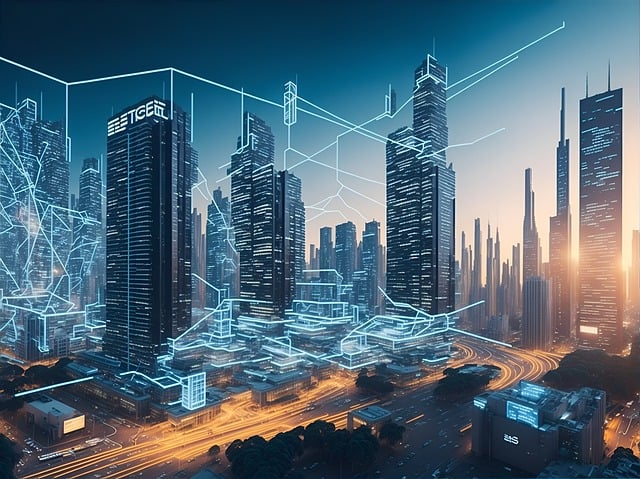Integrating Artificial Intelligence (AI) into landscaping design, particularly through AI landscape lighting and eco-efficiency audits, significantly enhances sustainability practices. AI algorithms optimize space usage, reduce environmental impact by efficient watering and energy consumption in lighting, and promote biodiversity with native plant species. These technologies conduct deep analyses of existing systems to identify inefficiencies, suggest energy-saving solutions, and protect nocturnal wildlife habitats, contributing to a more sustainable urban environment while enhancing green spaces' aesthetic appeal.
“In an era focused on sustainable living, Artificial Intelligence (AI) emerges as a powerful ally in shaping eco-friendly landscapes. This innovative technology is transforming traditional landscaping practices, promoting native ecosystem protection, and enhancing overall sustainability.
Our article explores the multifaceted integration of AI into green spaces, from design innovations that minimize environmental impact to its role in optimizing landscape lighting, making ecosystems thrive. We delve into AI’s capability to conduct eco-efficiency audits, providing insights for enhanced landscaping sustainability.”
- Integrating AI into Eco-Friendly Landscaping Design: Strategies for Sustainable Practice
- The Role of AI in Optimizing Landscape Lighting: Energy Efficiency and Native Ecosystem Preservation
- AI-Powered Eco-Efficiency Audits: Evaluating and Enhancing Landscaping Sustainability
Integrating AI into Eco-Friendly Landscaping Design: Strategies for Sustainable Practice

Integrating Artificial Intelligence (AI) into eco-friendly landscaping design offers a promising strategy for sustainable practices. By leveraging AI, landscape architects and designers can optimize space utilization while minimizing environmental impact. For instance, AI algorithms can analyze historical weather data to determine efficient watering schedules, reducing water wastage. These systems can also suggest native plant species suited to the local climate and soil conditions, thereby promoting biodiversity and reducing the need for chemical fertilizers or pesticides.
AI-powered eco-efficiency audits play a pivotal role in this context. These digital tools can scan and assess existing landscapes, identifying areas for improvement in terms of energy use, waste management, and resource optimization. Through AI landscape lighting design, for example, smart sensors can automatically adjust lighting levels based on ambient conditions, reducing energy consumption. Such integration not only enhances the aesthetic appeal of green spaces but also contributes to a more sustainable and resilient urban environment.
The Role of AI in Optimizing Landscape Lighting: Energy Efficiency and Native Ecosystem Preservation

Artificial Intelligence (AI) is transforming landscaping practices, especially in the pursuit of eco-friendly and sustainable solutions. One significant area of impact is landscape lighting, which, when optimized using AI technologies, can lead to substantial energy savings and preserve native ecosystems. AI algorithms can perform detailed analyses of outdoor lighting systems, identifying inefficiencies and areas for improvement. These intelligent systems consider various factors such as light distribution, timing, and intensity, ensuring that every part of a landscape is illuminated optimally without excess waste.
By conducting eco-efficiency audits, AI tools can recommend energy-saving fixtures, control mechanisms, and scheduling strategies. This approach not only reduces electricity consumption but also minimizes the environmental footprint of landscaping. Moreover, native ecosystem preservation is a critical aspect of this process. AI-driven lighting designs can focus on enhancing natural features while minimizing light pollution, ensuring that nocturnal wildlife habitats are respected and protected.
AI-Powered Eco-Efficiency Audits: Evaluating and Enhancing Landscaping Sustainability

AI-driven technology is transforming the way we approach landscaping, particularly in the realm of sustainability and native ecosystem preservation. One such innovation is AI-powered eco-efficiency audits, which offer a comprehensive evaluation of landscaping practices. These audits leverage advanced algorithms to analyze various factors, from water usage patterns to the carbon footprint of materials used, providing an in-depth understanding of a site’s environmental impact.
By integrating AI into landscape lighting designs, for instance, professionals can optimize energy consumption and reduce waste. Smart sensors and machine learning models can adjust lighting based on real-time data, ensuring efficient illumination only when and where it’s needed. This not only minimizes energy costs but also contributes to overall ecological sustainability, aligning with the goal of preserving and promoting native ecosystems in urban settings.
Artificial Intelligence (AI) is transforming the way we approach landscaping, offering innovative solutions for creating sustainable and eco-friendly outdoor spaces. By integrating AI into design processes, optimizing landscape lighting with energy-efficient techniques, and conducting AI-powered audits, we can significantly enhance the sustainability of our urban and natural landscapes. These strategies not only preserve native ecosystems but also contribute to a greener future, ensuring that our cities and surroundings remain vibrant and environmentally conscious. With AI at the forefront, we can achieve beautiful, sustainable landscapes that benefit both people and the planet.
